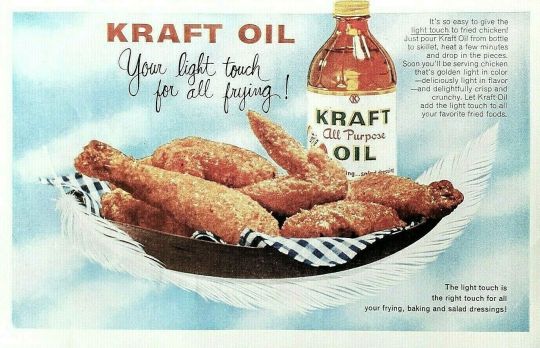#cooking oil
Explore tagged Tumblr posts
Text
Dr. Berg 🤔
#pay attention#educate yourselves#educate yourself#knowledge is power#reeducate yourself#reeducate yourselves#think about it#think for yourselves#think for yourself#do your homework#do some research#do your own research#ask yourself questions#question everything#fried food#cooking oil#for your health#health tips#healthy living#stay healthy
208 notes
·
View notes
Text

This makes even shrimp look tasty.
Family Circle - October 1958
#1958#recipes#fried food#corn oil#cooking oil#vintage ads#vintage ad#advertising#advertisement#1950s#1950s ad#1950's#1950's ad#funny#humor#humour
26 notes
·
View notes
Text

My favorite-
I just Ahhhahahahhdhsbshayagahsn
#starlight express#stex#greaseball the diesel#dinah the dining car#stex greaseball#stex dinah#greasedinah#dining of champions#cooking oil#oil soup
153 notes
·
View notes
Text

Advertisement for Kraft All Purpose Oil (1959).
#vintage advertisement#1950s#kraft#cooking oil#food#cooking#frying#fried chicken#kraft all purpose oil#kraft oil#usa
18 notes
·
View notes
Text
#curious what other people use cuz my brother and me are experimenting with different kinds of oil#polls#cooking oil
6 notes
·
View notes
Text
Used frying oil + stearic acid = easily disposable goo
I really like deep frying food like doughnuts and kara age chicken but have been forgoing it for a while because of the difficulty of disposing of the oil. If you filter out any food crumbs after it cools down and/or clarify it using gelatin, you can re-use deep frying oil two or three times, but after repeated use it darkens and tends to develop an unpleasant flavour affecting the food. After that it's got to go.
You shouldn't pour it down the sink because it can contribute to fatbergs forming in the sewers. You can pour it back in the original bottle, put on the lid and put it out in the rubbish, but that means the bottle doesn't get recycled and the oil is trapped inside it in the landfill, unable to biodegrade. Restaurants have access to commercial oil removal services, which nowadays often convert the old oil to biodiesel so it gets another use, but these usually don't take oil from people's homes (kerbside oil collection may be available in some places, but certainly not where I live). I felt stink about the available options so I stopped deep-frying for a while to avoid the problem.
However, I've learned of a clever trick! You can buy stearic acid quite cheaply from the kind of stores that sell supplies for making scented soaps and candles. It's a substance sold in the form of small flakes or granules that has the property of solidifying oils (hence useful for making soaps and candles).
To solidify deep frying oil, either do this shortly after you finish cooking with it, or (if you're me) reheat some old oil you have sitting around in a bottle that you don't feel right about throwing away. It doesn't need to be super duper hot, just anywhere above about 100ºF/38ºC. For each cup of oil, add three tablespoons of stearic acid and let it dissolve (it will be pretty quick). Turn off the heat and put the pot at the back of the stove or somewhere else that it can cool down undisturbed.
The time it needs to solidify will vary depending on things like the quantity of oil and how well the pot retains heat, but I found that within a couple of hours four cups of oil in a cast-iron pot had gone cold and turned to a soft jelly consistency that could be easily scooped out of the pot and dropped in the rubbish bin. Grand.
There are, of course, packaged mixtures you can buy that do the same thing (one brand is called Fry Away) but plain stearic acid is cheaper so yay!
#cooking#deep frying#oil#cooking oil#stearic acid#chemistry#oil solidifier#waste disposal#you get two clever cooking oil tricks for one in this post I hope you enjoy the gelatin one too#long post
8 notes
·
View notes
Text
The chicken is going to be soooo good

#Campfire Cooking in Another World with My Absurd Skill#frying#frying food#oil#fried#cooking#cook#boiling#boil#fryer#gif#pot#cooking oil
4 notes
·
View notes
Text
Buy Sesame Oil Online | Sesame Oil Buy | Where To Buy Sesame Oil
I am thrilled to tell you about the premium quality Sesame Oil by Delistathi Sunflower. This oil is sourced from only the finest sesame seeds, carefully cold-pressed to retain all of its natural flavors and nutrients. Known for its rich, nutty taste and incredible health benefits, this sesame oil is a must-have in any kitchen.

#ecommerce#startup#Buy sunflower oil#Buy sunflower oil online#Delistathi Sunflower Oil#sunflower oil#cooking oil#vegetable oil#refined oil#edible oil#food oil#what is the best oil#cooking oil company#best oil to use#healthiest oils
2 notes
·
View notes
Text
Dubai Company Buys Used Cooking Oil to Turn Into Biofuel for Cars Citywide to Reduce CO2 Emissions https://www.goodnewsnetwork.org/lootah-biofuels-buys-used-cooking-oil-to-turn-into-biofuel-for-cars-in-dubai/
5 notes
·
View notes
Text

Though Mr. Peanut smiles for his adoring fans on the inside he despairs for the billions of innocent family and friends crushed by the evil oil company.
Sunset The Magazine of Western Living - April 1944
#1944#cooking oil#salad oil#peanuts#mr peanut#vintage ads#vintage ad#advertising#advertisement#1940s#1940s ad#1940's#1940's ad#funny#humor#humour
21 notes
·
View notes
Text

Just love the fact that Dinah is the only coach that Greaseball actually pays attention too 🤭 he just loves his girl💕
Also the little kissy kissy 🫶🫶🫶
#starlight express#stex#greaseball the diesel#greasedinah#dinah the dining car#dining of champions#stex greaseball#stex dinah#cooking oil#oil soup
71 notes
·
View notes
Photo

‘Your light touch for all frying!’
Kraft All Purpose Oil advertisement (1959).
#vintage advertisement#1950s#kraft#kraft oil#cooking#cooking oil#frying#food#usa#kraft all purpose oil#fried chicken
35 notes
·
View notes
Text
Is Your Oil Pure? How Processing Impacts Food Safety
We all have that favorite bottle of oil sitting in the kitchen—the one we reach for when it’s time to fry, sauté, or drizzle. But have you ever wondered what’s actually inside that bottle? Is it as pure as it claims to be?
Here’s the thing: not all oils are as innocent as they look. Behind the scenes, there’s a whole process called cooking oil processing that decides whether your oil is clean, safe, and worth using—or if it’s hiding some not-so-great surprises.
If an oil hasn’t been processed properly, it could contain leftover chemicals, impurities, or even unhealthy additives. That’s not exactly something you want in your stir-fry.
The good news? You don’t need to be a food scientist to make a smart choice. Look for oils that are cold-pressed or properly refined by trusted brands. These are processed with care, keeping both safety and nutrition in check.
1 note
·
View note
Text
Vanalaya’s high-quality cooking oils mean choosing purity, authenticity, and sustainability that can transform your culinary experiences, contribute to a healthier lifestyle, and bring unparalleled flavor to your table. With our commitment to excellence and customer satisfaction, Vanalaya is dedicated to enriching your cooking adventures. Buy cooking oil online today and experience the difference that exceptional cooking oils can make in your meals and health.
0 notes
Text
Used Cooking Oil Powers Aviation Sustainability Efforts
Used cooking oil is now a key resource for producing sustainable aviation fuel (SAF), which has lower carbon emissions and helps prevent environmental pollution. Minister Nik Nazmi Nik Ahmad emphasized that recycling used cooking oil reduces pollution to waterways while contributing to carbon reduction in aviation—one of the highest emission sectors. Used Cooking Oil Powers Aviation…
0 notes
Text
Had an interview today with a butcher talking about how beef tallow is getting popular again now that people are moving away from seed oils. And I just had flashbacks to the 90s when everyone decided to switch away from beef tallow to switch to seed oils. It's all so fucking arbitrary.
#cooking oil#like maybe 1 in 100 people i talk to actually know anything about the science around cooking oils#and that's if i'm being generous
1 note
·
View note